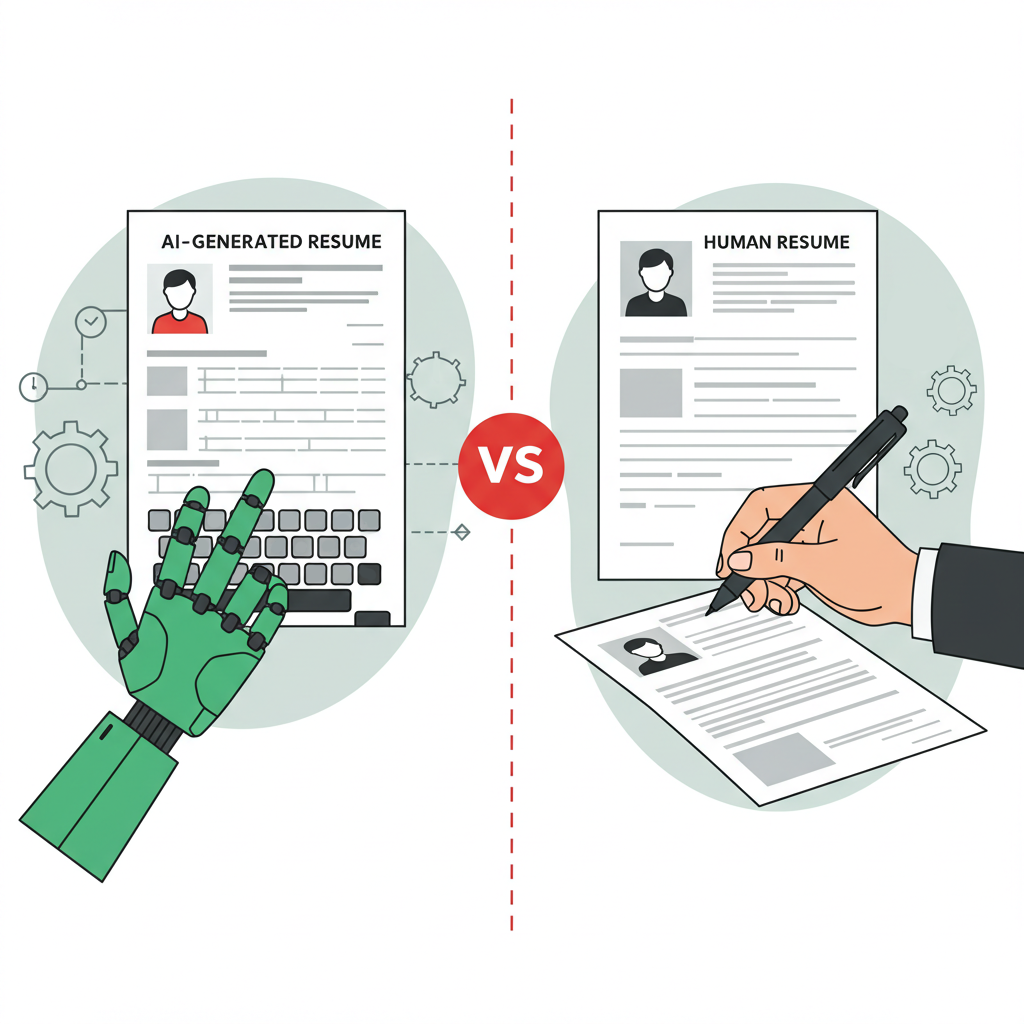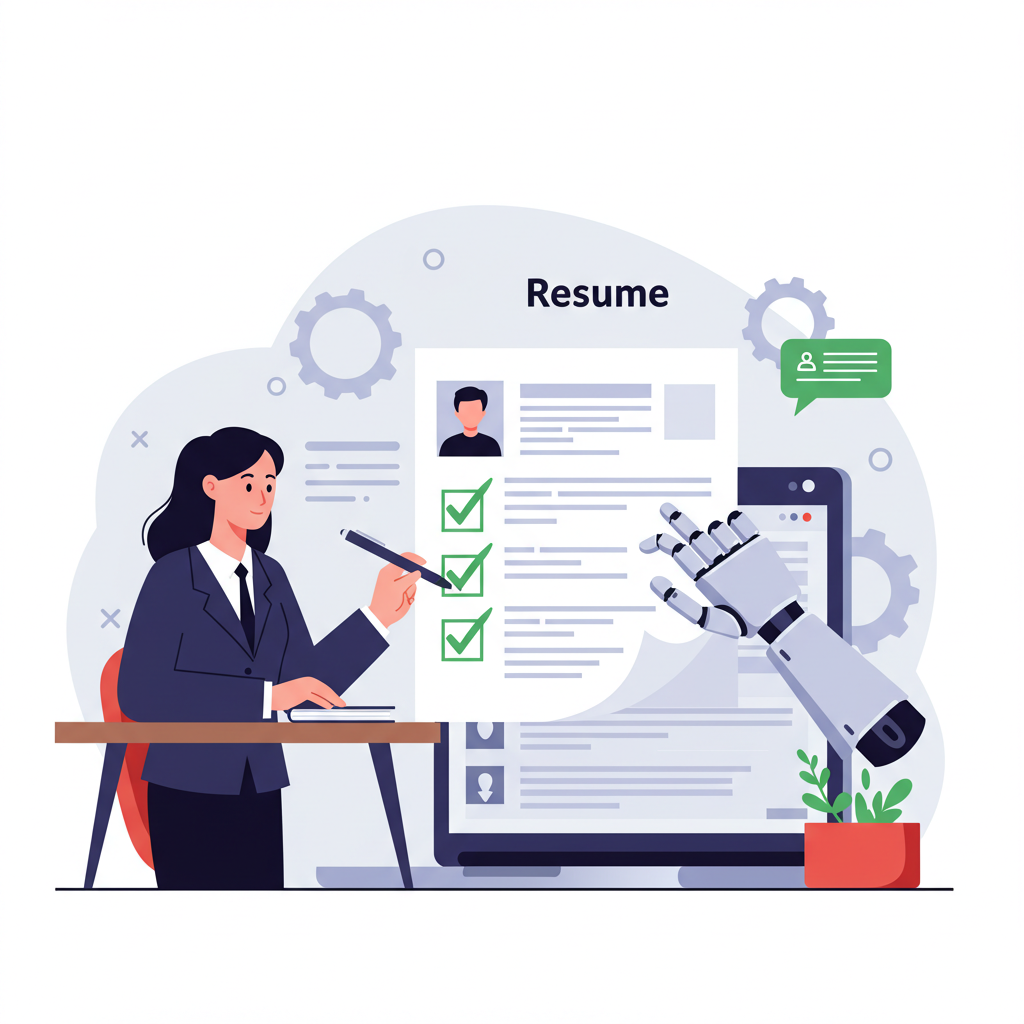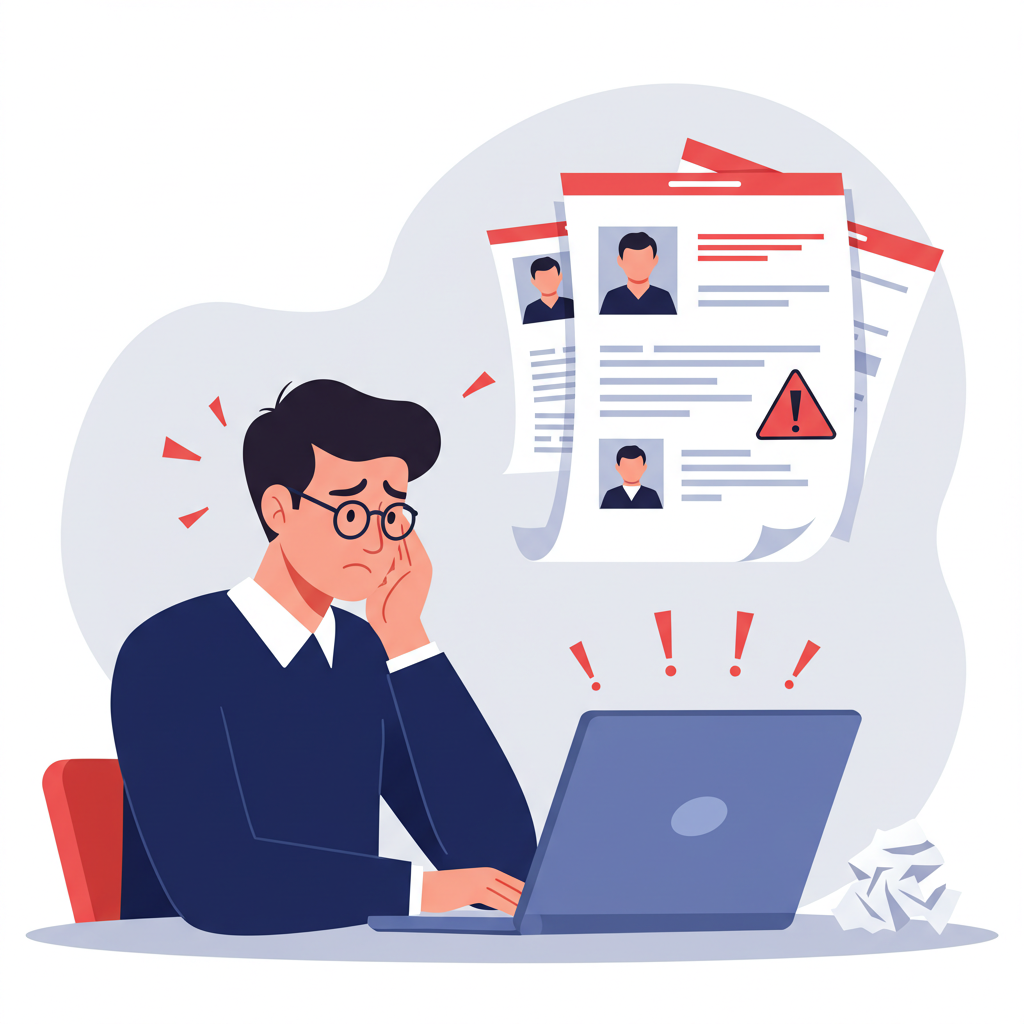First and foremost, AI for resume writing is convenient and fast. It offers features like keyword optimization, grammar checks, and formatting suggestions. Thanks to the tools that write a resume for you, you can speed up the resume creation process. But will you have a good resume? That’s the catch. An AI-generated document is no match for the personalized content you would get from the best resume writing services.
The resume is more than a job application document. It’s a personal narrative that conveys your individuality, achievements, and career aspirations. AI is certainly helpful for ideas and minor refinements. But we don’t recommend that you rely on it entirely. That way, you risk losing the human touch that makes your resume stand out.
With artificial intelligence, things are never simple. There are right and wrong ways to use it in the job application process. So, let’s cover all the details to see how you can use these tools to your advantage.
The Role of AI Tools for Resume Writing
Let’s make this clear right from the start: AI tools cannot replace human writers. We recommend using them only for assistance in the writing process. It’s important to know what the tools can and cannot do so you’ll figure out how you can use them.
What AI Can Do for Your Resume
1️⃣ Analyze Job Descriptions and Draw the Right Keywords
AI tools are quite effective at scanning job descriptions and identifying keywords you can use in the resume. You can ask the tool to suggest terms and phrases that would improve your application’s compatibility with ATSs. With that, you’ll improve your chances of passing the initial screening process.
2️⃣ Offer Formatting Suggestions and Templates
You can ask the tool of your choice to give you a comparison between entry-level resume writing and executive resume writing. Its suggestions will help you understand how to write at the needed level. You can also get formatting recommendations that would improve the readability and visual appeal of your document. But tools like ChatGPT aren’t always right. If you get recommendations for font size, section arrangement, and alignment, always double-check the correctness of the answers before relying on them.
As for templates, they can be pretty useful. AI resume builders offer a variety of templates that can help you format your resume. But the content you write in that template must be personalized.
3️⃣ Offer Grammar and Spell-Checking Suggestions
One of the most straightforward features of AI tools is their ability to improve grammar, spelling, and punctuation. You can use a tool’s suggestions to eliminate common mistakes that could undermine your credibility as a candidate.
How AI Works for Resume Writing
Artificial intelligence relies on advanced algorithms to analyze, generate, and improve content. Let’s see how the system works, so you’ll understand its strengths and limitations. There are two ways to use AI: resume builders and popular AI tools.
AI Resume Builders
These are specialized tools designed to give you a resume after you provide information. You’ll need to share the details about your career history, skills, and job preferences. Then, the resume builder will process the input with NLP (natural language processing) algorithms. As an output, it will give you a polished resume.
It will be properly formatted and complete with keyword enhancements. Resume builders are good because the result has a professional layout and clear section headers. You can immediately download the resume and use it for an application. But we don’t recommend doing that, since it will be generic. Hiring managers can easily notice it was AI, not you, that wrote the resume. You don’t want to make such a first impression, so we recommend using the result as a template only.
These are some of the most popular AI tools for resume creation:
Zety
Jobscan
Rezi
Conversational AI Tools for Resume Creation
Commonly used AI platforms like ChatGPT can also assist with writing tasks. But there’s a big difference between these general-purpose AI tools and dedicated resume builders:
Conversational tools are designed for versatile text generation. They can help you write bullet points, improve descriptions, and brainstorm ideas. However, they don’t have specialized features like pre-set templates and ATS optimization.
Resume builders are much easier to use. General AI chats require you to provide clear and specific prompts. For example, you can ask: “Write me a resume summary for a marketing manager with 10 years of experience.”
The results you generate with AI chats will need more editing. Specialized resume builders give you a more polished output.
Benefits of Using AI for Resume Writing
The best AI for resume writing is appealing as a quick and convenient solution. We all know that resume writing is a lengthy and challenging process. Thanks to these tools, it’s easier for job applicants to prepare the document by the application deadline.
These are the most important advantages of AI tools:
✅ They Are Efficient
AI tools will quickly generate a draft. You’re required to provide a few inputs, such as your work experience and skills. Then, the platform will produce a structured resume that looks polished. It will require some editing and refinement. However, the process is much quicker when compared to writing a resume from scratch.
✅ AI Resume Builders Have Automated Formatting
Formatting a resume is not an easy task. You have to make sure that every section, heading, and bullet point is consistent in font, size, alignment, and spacing. Even the smallest inconsistency will be obvious to a hiring manager, who is used to analyzing resumes. It’s also hard to strike a balance between a clean layout and an attractive design.
AI tools handle the formatting process effortlessly. They automatically adjust the margins, align the text, and ensure consistency in all aspects.
✅ They Are Affordable
When compared to professional writing services, automated resume builders are certainly more affordable. You can even use AI to write resumes for free. The results are not comparable, though. A professional writer will deliver a resume that’s ready to submit. AI, on the other hand, gives you an output that requires some heavy personalization. But if you’re prepared to invest some effort into revising and adjusting the AI result, using a resume builder tool is a good idea.
✅ They Are Instantly Accessible
Yes, resume writing services work around the clock. But it takes some time for a writer to accept your instructions and work on them. Human-written resumes require time and effort, even though professional writers are trained to deliver them quickly. AI tools are available in an instant. They give you quick results. But it will still take you some time to refine and revise the output.
Risks of Using AI in Resume Writing
If you rely on AI too much, a hiring manager will definitely notice. There are serious drawbacks of resume generation tools that you must understand:
❌ No Personalization
Yes, all resume-generating tools are marketed to deliver personalized results. But they don’t. Artificial intelligence, no matter how advanced it gets, cannot mimic your personality. With so many candidates using the same tools to generate resumes, all job applications look alike. Only a human touch will make your content stand out.
AI is good for organizing and structuring content. It works to give you ideas. But it fails at capturing your personal style, unique achievements, and the depth of professional experience you have. A generic resume makes it hard for the employer to see what truly sets you apart as a candidate.
❌ Unsuitable Tone
AI tools can’t understand the nuances of specific industries or roles the way experienced people do. Yes, the tools can recognize broad terms. However, they may not grasp industry-specific jargon, technical skills, and the nature of specialized positions. As a result, they can misinterpret your instructions and deliver a result that doesn’t fit into your application.
Let’s say you need a resume for a highly technical role. A resume builder will probably fail to convey the correct terminology. The tone won’t match your level of expertise, and you will look like a candidate who’s out of touch with industry standards if you submit it without heavy editing. In fields where language precision matters, AI resume builders rarely work.
❌ Too Many Keywords
Artificial intelligence gets the need for keywords quite literally. Easy keyword optimization for ATS is certainly an advantage, but too many of those phrases lead to unnatural writing. It might work for ATSs, but it will disturb the natural flow for a human reader.
❌ Possibility for Errors
AI tools are not 100% accurate. They can offer incorrect suggestions or misrepresent your experiences. This is quite likely to happen if you offer complex information for the tool to handle. For example, you may get a wrongly categorized skill, misstated accomplishments, and an altered meaning from the one you intended to achieve.
Remember this: AI doesn’t have the emotional intelligence and reasoning of an actual editor. If you don’t review and correct the result, you risk sending out a resume with critical mistakes.
When to Use AI for Resume Writing
In these situations, relying on artificial intelligence for resume writing is perfectly fine:
✅ Making Minor Edits
If you already have a resume but you need some editing help, you can get good suggestions from AI tools. Grammar and spell-checking are among the most common uses of AI tools in all kinds of writing. They can help you identify common language mistakes and correct them.
In addition, AI can offer suggestions for clearer phrasing. If you follow the hints, you can improve the readability and flow of your resume. For example, you’ll get a warning for an overly long sentence and awkward phrasing.
But take those suggestions with a grain of salt. AI cannot reach the level of a human editor, so always double-check if something feels off.
✅ Keyword Optimization (to a certain extent!)
If you’re willing to write your own resume but don’t know how to make it compatible with Applicant Tracking Systems, AI tools can help. You can ask the tool to optimize your content by analyzing the job posting and suggesting keywords to include.
Once you include the right keywords, your resume is more likely to pass the first stage of the hiring process. That’s especially important for competitive roles. For such positions, employers get a huge number of applications. They don’t have the time or energy to read all resumes in detail, so they delegate the first stage of filtering to the ATS.
But be careful; you need the right dose of keywords in your resume. Too many of them will negatively affect its quality. A hiring manager will immediately notice that you relied on AI if you go overboard with the keywords.
✅ Getting Formatting Help
AI tools are great for aligning sections, ensuring proper spacing, and maintaining a clean layout. It’s great that you can automatically structure your resume. These tools rely on pre-designed templates that fit your content. If you’re using a conversational AI tool, you can ask for formatting tips regarding the margins or text alignment.
For job applicants who aren’t familiar with resume design, AI ensures that their job application follows the best practices in that aspect.
When to Avoid AI in Resume Writing
In some situations, AI simply doesn't work. It’s important to know your limits, so you’ll create a successful resume. This is when to avoid AI tools for resume writing:
For Personalized Career Stories
AI tools may be efficient, but they won’t capture the individuality of your career journey. When addressing your unique achievements, career transitions, or challenges you overcame, you need to rely on storytelling. AI doesn't (yet?) have the required emotional intelligence to deliver such a level of personalization. A strong resume will convey your individuality. When the hiring manager reads it, they will define your professional identity.
If you need the resume to address a major career change or challenges you overcame, it demands a personal touch. Human writing is also necessary to show personal growth. In those cases, AI content comes across as generic. It doesn’t reflect the depth of your experiences, which is important if you want to be a memorable candidate.
For Highly Technical or Creative Roles
If you aim for a role that demands specialized knowledge or a high degree of creativity, it’s best to avoid relying on AI. These tools can’t grasp the complexity of skills in engineering, IT, or research. They deliver vague descriptions that don’t reflect the level of knowledge and skill you have. When addressing creative roles, such as writing, design, or marketing, AI comes across as overly generic. A resume generator won’t show innovative thinking and a personal style.
For Situations When Privacy Is a Concern
Sharing sensitive personal information with AI platforms comes with a certain dose of risk. Many AI tools are secure. But keep in mind that you’re still sharing personal details, such as contact information, career history, and potentially confidential achievements. The possibility of data breaches and misuse of information is always a concern in those situations.
If the information you provide is highly confidential, it’s best to avoid using AI for the task of resume writing. Manually writing and editing your resume is the only 100% secure approach.
Alternatives to AI Resume Writing Tools
Are you afraid that the use of AI would result in an overly generic resume but still want an easy way to get it done? These are the alternatives to consider:
Hiring Professional Resume Writers
Only a human writer can deliver a high-quality resume that’s custom-tailored and unique in every aspect. If you’re unable to write it yourself, hiring a pro writer is an excellent investment. These experts have years of experience in writing resumes that convey your strengths and individuality as a candidate. They are aware of all formatting standards and industry trends. The resume will be visually appealing, too.
A professional resume writer will consider your individual career goals, achievements, and the specific job market you’re targeting. They will also use the right keywords to make the application suitable for ATSs.
Improving Your Resume Writing Skills
Do you want to take full control of the resume writing process? You can take online courses, follow online guides, and use templates to improve your resume writing skills. Our blog offers valuable tips that will help you create a compelling resume. You can learn everything, from structuring your document to making it appealing for the specific industry.
It will take some time for you to come up with the perfect resume if you follow this path. But the goal is definitely worthy of an effort. Once you master the art of resume writing, you’ll be able to update and improve your resume as your career evolves without relying on any help from AI or pro writers.
Peer Reviews and Networking
Do you already have a resume and only want some improvements to it? In that case, you can ask for feedback from peers, colleagues, or mentors. Be careful to only share your resume with trusted individuals in your network. Ask if they notice something you’ve overlooked. Does your resume accurately reflect your skills and experiences? Unbiased feedback can point out areas for improvement.
Practical Tip: Combine AI with Manual Efforts
✅ If you decide to use AI for resume writing, you should use it as a secondary tool for refinement. It will complement your writing efforts in a nice way, but it can never replace them. Once you draft your resume manually, you can use artificial intelligence to refine the language, fix grammar errors, and make the formatting consistent. AI can also help with its recommendations for clarity, removing redundancies, and suggesting concise phrasing. The core of your resume must remain personal, and you can use AI to polish it to perfection.
Before implementing any of the suggestions, you must verify them. AI may suggest rephrasing that alters your personal voice. The suggestions may also be inadequate for the role you’re applying for.
Relying solely on AI-generated content for your resume is a big NO-NO! A pre-programmed tool could never keep the content authentic and convey your unique experiences. It may suggest some general improvements, but it can’t understand the nuances of the role and the specific employer’s needs.
 The Future of AI in Resume Writing
The Future of AI in Resume Writing
AI isn’t going anywhere, it’s only getting more sophisticated. In the future, we expect job candidates to rely even more on AI tools to get help with their resumes. However, we also expect artificial intelligence to offer insights based on predictive analytics. It would be great for the tools to analyze market trends and recommend skills based on the standards for the specific role.
One thing that will remain important is to balance between automation and personalization. It would be great to ask AI to create a resume and get it done in a matter of minutes. However, personalization is only possible through human editing. Software cannot capture your unique experiences, achievements, and personality.
A hybrid approach will probably be needed in the future, too. Candidates will use AI to get more efficient, but they must have control over the final content. This balance will keep resumes technically optimized but unique at the same time.
Summary
Needless to say, AI tools make resume writing easier. They are efficient and convenient and help with ATS optimization. They are excellent if you need help refining your grammar, improving the formatting, and adding some keywords. However, the capacity of AI is limited when it comes to personalizing content and making it fit for highly specialized roles.
For the most important career steps, it’s wise to get a professional resume from an experienced writer. Then, you can use it as a foundation that you’ll update as you progress further in your career journey.








